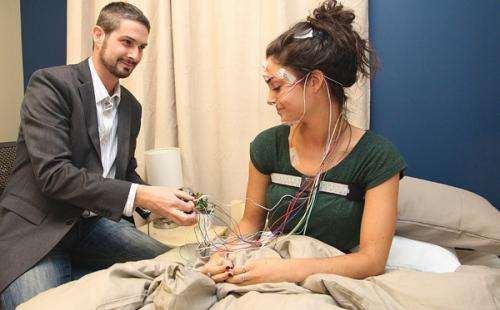Neuroscientist not napping on idea of explaining sleep

Don't nod off on this one. A Western neuroscientist is exploring the possibility sleep isn't so much about rest from a busy day as it is about memory consolidation – or, more simply, the process needed to form lasting memories.
"There is a certain role sleep plays, and that is in the enhancement of memory," said Stuart Fogel, who recently joined Western's Brain & Mind Institute. "Sleep is a very active state, not just one of rest and recharge. Sleep is actually doing something entirely new and different. When we learn something new, sleep actually reformulates or reconstructs memories in an entirely different way, so down the road these memories are stronger and more accessible, and we perform better.
"When sleep follows learning, enhanced memory consolidation is observed as compared to an equivalent period of wakefulness," Fogel added. "Sleep supports normal development, enhancement and regulation of the human body but it also, very importantly, encourages the same things in the brain."
With the new Brain & Mind Sleep Research Laboratory, Fogel studies behavioural testing to cognitive testing, all within a full clinical setting, complete with three sleeping quarters.
A 32-channel electroencephalogram (EEG) records everything from brain waves, rapid eye movement (REM), muscle activity, reparatory effort, pulse and what Fogel refers to as so much "rich data" to begin to explore a lot of unanswered questions.
"Sleep is one of the core biological functions required by the brain and the body, and one of the strongest biological drives, such as hunger or thirst. We can't live without it," said Fogel, who hopes to begin his work within the next month or so. "The drive and need for sleep indicates it serves some particular function. It goes beyond alleviating fatigue and tiredness. It's like saying the function of eating is because you're hungry, but hunger is just a symptom, like sleepiness is just a symptom; it doesn't represent the function necessarily."
Fogel's research could even study the relationship between sleep and intellectual ability.
"We can look at the EEG of sleep and it gives us a window into the markers for cognitive abilities," he said. "For example, take a hockey player, pianist or computer programmer; just the physiological signatures of sleep actually give us some insight into disseminating between people's various cognitive abilities."
Fogel aims not only to study the physiological reactivation of memories during sleep, but also uncover physiological and cognitive evidence of memory replay during sleep.
"One of the major unresolved questions that exists in science is we still haven't been able to answer why do we sleep – not only sleep itself, but conscious and mental activity that occurs during sleep, and the transitions that occur during sleep, such as dreams," she said. "So, we know very little about that. Now, techniques are being developed that are giving us the tools to do this in a systematic and objective way. This may ultimately help answer the age-old question of why we sleep, and provide insight into the function of dreams."
So, the question all students are dying to know: Is cramming before an exam productive?
"I would recommend people avoid all-nighters," Fogel said. "Cramming is okay, as long as you get enough sleep so that you'll consolidate that material. It will be cemented and better integrated with your existing knowledge and you'll be able to perform better."
















